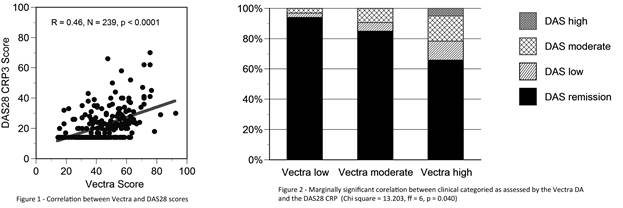Session Information
Session Type: ACR Poster Session C
Session Time: 9:00AM-11:00AM
Background/Purpose: Vectra
DA, a blood test that integrates the blood levels of 12 biomarkers into a
single score (1-100), is claimed to provide an objective measurement of disease
activity in RA patients. There is considerable controversy on whether it adds
actionable information to that provided by joint examination, CRP, and ESR, and
the resulting DAS scores. The purpose of this investigator-initiated
non-sponsored study was to evaluate the correlation between Vectra DA and DAS28
CRP scores in RA patients followed in a solo practice.
Methods: Patients with an
established diagnosis of RA underwent the Vectra DA test; the DAS28 CRP
activity score was calculated at the time of the examination, when Vectra DA scores
were unknown. Scores from each test were analyzed by multivariate linear regression.
Levels of disease activity associated with the scores for each test were
compared by the chi-square test.
Results: Vectra DA and
DAS28 CRP scores were available for 239 unique patients (mean age 63.4 years,
SD 13.2; 79% women; 40% African American, 36% Hispanic, and 25% White). RF was
positive in 159 patients (67%) and CCP in 125 (52%); 129 patients were on DMARDs
only (54%); 19 (8%) had only biologics; 72 (30%) were on combinations of DMARDs
and biologics; and 19 (8%) had prednisone only or no therapy. There was a
significant but weak correlation between Vectra DA score and the DAS28 CRP
score (r2 = 0.2102 or r = 0.4584; Figure 1), which was unaffected by
age, sex, or ethnicity. In a multivariate linear regression analysis that
included the type of therapy, the correlation improved slightly (r2
= 0.321). In concordance with this weak correlation, the relationship between the
3 Vectra DA and the 4 DAS categories (Figure 2) also yielded a marginally significant
chi-square (chi-square = 13.203, df = 6, p = 0.040). However, only 6 of 120
patients in a high Vectra clinical category were also in a high DAS category
(concordance = 5%); of the 204 patients with a DAS in remission or low, only 32
were in the low Vectra category (concordance = 16%).
Conclusion: In a previous validation study Vectra DA
scores showed a significant correlation with DAS28 scores. While our study
confirmed a statistically significant but weak correlation, it also showed that
when clinical categories rather than raw scores were used, the concordance
between the two tests was minimal. Since therapeutic decisions based on a test
that may not accurately reflect a patient’s clinical status would be
inappropriate, cost effectiveness and benefits of this expensive test should be
reevaluated.
To cite this abstract in AMA style:
Genta MS, Sonnenberg A, Genta RM. Poor Correlation Between Vectra DA and DAS28 Scores in Patients with Rheumatoid Arthritis [abstract]. Arthritis Rheumatol. 2015; 67 (suppl 10). https://acrabstracts.org/abstract/poor-correlation-between-vectra-da-and-das28-scores-in-patients-with-rheumatoid-arthritis/. Accessed .« Back to 2015 ACR/ARHP Annual Meeting
ACR Meeting Abstracts - https://acrabstracts.org/abstract/poor-correlation-between-vectra-da-and-das28-scores-in-patients-with-rheumatoid-arthritis/

